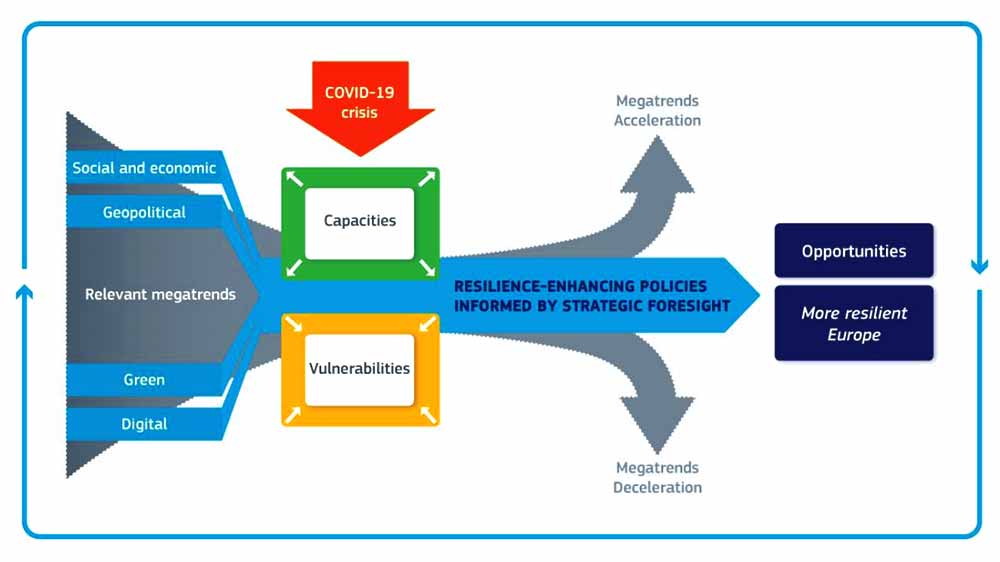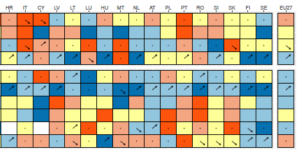
European Commission
The long-term performance of democracies hinges on their adaptability in the face of new realities and resilience to internal and external challenges, according to a new report.
The European Commission’s 2021 Strategic Foresight Report outlines global trends, uncertainties and choices that will shape Europe’s future and it builds on an earlier analysis which introduced resilience as a compass for EU policymaking. The new report identifies key structural global trends towards 2050 that will determine the EU’s capacity and freedom to act: climate change and other environmental threats; digital hyperconnectivity and technological transformations; pressure on democracy and values; shifts in the global order and demography.
“Geopolitical contestation, inter-state polarisation and tensions are likely to persist in the coming decades,” the report states. “If the ongoing erosion of democratic governance continues, it will affect both established and emerging democracies. The long-term performance of democratic systems hinges on their capacities to adapt to new realities and to remain resilient to internal and external challenges.”

Resilience dashboard/European Commission
The EU is the largest group of democracies in the world, but democratic governance is declining globally. 2020 was the 15th consecutive year of a decline in political rights and civil liberties at a global level, exacerbated by the coronavirus pandemic. Some 34% of the world’s population lives in countries where democratic governance is declining and only 4% lives in countries that are becoming more democratic, says the report, citing research from Freedom House and the University of Gothenburg’s V-Dem Institute.
Strengthening institutional resilience
Increased polarisation shows the need for participatory and inclusive governance to enhance trust and legitimacy at all levels, the report states:
Public institutions and administrations need to be responsive to societal concerns and
effective in delivering policies….. Institutions and processes need to increase their resilience, adapt and innovate to cope with new challenges and deliver results for citizens. New forms of participatory democracy, new technologies, civic participation and grassroots innovations, as in the context of the Conference on the Future of Europe, can enhance political participation and strengthen the resilience of our democratic systems.
The Commission has developed resilience dashboards as monitoring tools for assessing the EU’s and Member States’ vulnerabilities and capacities across four dimensions: social and economic, green, digital and geopolitical. The dashboards include a selection of indicators that depict:
- Capacities – enablers and/or opportunities to navigate the transitions and face future shocks; and
- Vulnerabilities – obstacles or aspects that can exacerbate the negative impact of the challenges related to the green, digital, and fair transitions.
![]()
The choice of indicators was informed by strategic foresight concerning emerging megatrends – long-term driving forces likely to have a significant impact on Europe’s future, including:
- Large-scale disinformation, powered by new tools and online platforms, will pose
increasing challenges to democratic systems and drive a new type of information
warfare. Countries, organised crime groups, businesses or individuals use these solutions to
spread disinformation globally or gain competitive advantages. This could threaten our
democracies, polarise debates, and put health, security and the environment at risk. - Both state and non-state actors are likely to strengthen their hybrid tools, including the use of disruptive technologies, spread of disinformation and misinformation, information operations and both military and non-military influence. Repression of freedoms and democratic reforms, as well as continued instability in countries and regions in near and further EU neighbourhood, like Afghanistan or Syria, will continue to have an impact on migratory pressure.
“To consolidate the EU’s role as a leading global actor on human rights, partnerships with countries and organisations that share democratic values are key,” the report adds. “Defending human rights requires using all available tools, including the EU Global Human Rights Sanctions Regime, political and human rights dialogues, strategic partnerships with international and regional organisations and proactive engagement in international fora.” RTWT
The EU report echoes themes and concerns raised by the International Forum’s Sharp Power and Democratic Resilience initiative which highlights issues in four areas relating to the health and integrity of democratic systems:
- Challenges to free expression and the integrity of media and information space
- Threats to intellectual inquiry
- Contestation over the principles that govern technology
- Leverage of state-driven capital for political and often corrosive purposes.
Glad to present the @EU_Commission‘s 2021 #StrategicForesight Report. It looks into 4 megatrends with a major impact on the EU, and identifies 10 areas of action in order to boost our open strategic autonomy and global leadership towards 2050. pic.twitter.com/Tr6wign9Bv
— Maroš Šefčovič🇪🇺 (@MarosSefcovic) September 8, 2021







